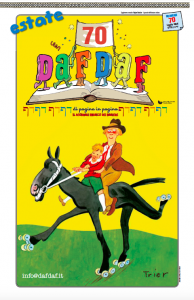MEDIA Seventy Times DafDaf
Seventy. DafDaf, the Jewish magazine for kids has arrived to its seventieth issue, with a special header by Paolo Bacilieri. When asked to write something for the occasion Guido Vitale, the editor-in-chief, has actually cheated: “The fact is that I am in trouble, and I am trapped in my calendar. It happened at the end of May, and now I do not know how to get out of it.”
He refers to a special calendar: “The words written on every page are by one of my favorite authors: Erich Kaestner, and the drawings are by a great friend of his who was one of the best illustrators of all times: Walter Trier. Those two were close friends and when in Berlin, where they lived, came the catastrophe of Nazism, their books were burned in the squares along with many others. Trier managed to save his life by fleeing to Canada, because he was a Jew and the dictatorship wanted to persecute and kill all the Jews and many other people used to think for themselves. But they remained friends although for very long they were separated. One wrote and the other drew whilst the Nazis were fighting their war against humanity. And the two friends were fighting their way to freedom, writing and drawing. The fact is that the page for May was dedicated to a very special book – the cover of the magazine this month is not by Luisa Valenti, but is dedicated to the illustration of Trier – ‘The 35th of May’ a day that does not come easily, but if it does, then anything can happen.” And Vitale goes on explaining that “DafDaf has arrived at number 70, and this is something to take seriously. Of course, 70 is a pretty big number, but to me just half of it would be enough. I’d settle to see the horse on skates and hear it announce that May 35th has now arrived.”
“Filò”, the section dedicated to philosophy and edited by Sara Gomel, addresses the complex issue of identity: “Are we sure to be a unique thing? Yes, we have a name that accompanies us throughout our lives, making us believe that we are always identical to ourselves. But time passes, and we change.” Filò is also a character illustrated by Luisa Valenti, and he will accompany the pages in the coming months.
“Books”, by Nadia Terranova, is about animals: “Mom, will you buy me a dog? No. A cat? No. At least a goldfish? A useless dream.” The less fortunate, those who live in small homes or with allergic parents will have to be content with the three books presented in the pages.
History pages this month tell the story of Golda Meir, the first woman Prime Minister of Israel, who said to young people: “Believe in yourself, become the kind of person with whom you would be happy to share your life. Fight to transform the small spark of a possibility into an achievement.” A great political figure, she was capable of coping with years of tension: the five years of the Meir government are still remembered by historians with respect and high regard, and although she did win a war with Israel, Golda Meir used to say “We hate the war. We do not rejoice in our victories, we rejoice when Israel grows a new type of cotton and strawberries are ripe.”
Panzanella, as Roberta Anau writes for “A tavola” is a nice word, and comes with memories of rural work, meals under a tree, it is suited to summer months, as is the Risogalos, the other recipe of this month. Simple ideas, to prepare together, at home, in long, hot afternoons.
There is time to read the Pirke Avot, as explained by Nedelia Tedeschi, and the last page, before the presentation of Ghila, from Milan, is dedicated to the synagogue of Genoa, which recently celebrated its first eighty years. The big party was attended by many people, both representatives of institutions and citizens and the chief rabbi of Genoa Giuseppe Momigliano said that even when remembering the past “we must look beyond, over time and space.”

